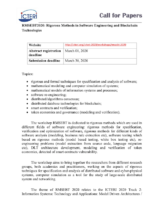RMSEBT2020: Rigorous Methods in Software Engineering and Blockchain Technologies
The workshop RMSEBT is dedicated to rigorous methods which are used in different fields of software engineering: rigorous methods for specification, verification and optimization of software, rigorous methods for different kinds of software analysis (modeling, business rule extraction etc), software testing which based on rigorous methods (model based testing, white box testing etc), re- engineering problems (model extraction from source code, language migration etc), DLT architecture development, modeling and verification of token economies, detected of smart contracts vulnerability.
The workshop aims to bring together the researchers from different research groups, both academics and practitioners, working on the aspects of rigorous techniques for specification and analysis of distributed software and cyber-physical systems, computer simulation as a tool for the study of large-scale distributed system and networking.
The theme of RMSEBT 2020 relates to the ICTERI 2020 Track 2: Information Systems: Technology and Applications: Model Driven Architectures /
Software Development, Business Process Management, Knowledge Extraction, Engineering and Management.
Submission Guidelines
The submitted papers for the RMSEBT 2020 workshop should be one of the following types (Similar types as in ICTERI 2020 main stream):
1) Full Research or Survey Papers.
The research papers in this category are the reports on the accomplished research work; they present a novel method, technique or analysis with appropriate empirical or other type of evaluation as a proof of validity. Survey papers may include a reasonable review placing the addressed problem onto the state-of-the-art landscape and analyzing how far current solutions fall short; clear definitions and argumentation are also expected in terms of qualitative or quantitative representation of the main characteristics of the problem.
− Evaluation criteria: originality, technical soundness, the soundness of the problem analysis, the soundness of the real use.
− Page limit: 16 LNCS pages
2) Short Research Papers and Extended Abstracts.
The papers in this category are the short reports of the preliminary results or describing the work in progress.
− Evaluation criteria: originality, technical correctness, and potential value of the planned results in a short to mid-term perspective
− Page limit: 12 LNCS pages for short papers; 6 LNCS pages for extended abstracts
3) Industry Experience Reports or Case Studies.
The papers in this category report on industrial deployments of ICT.
− Evaluation criteria: significance and practical relevance, technical soundness, and accompanying evaluation or industrial validation
− Page limit: 12 LNCS pages
List of Topics
- rigorous and formal techniques for specification and analysis of software;
- mathematical modeling and computer simulation of systems;
- mathematical models of information systems and processes;
- software re-engineering;
- distributed/algorithms consensus;
- distributed database technologies for blockchain;
- smart contracts and verification;
- token economies and governance (modeling and verification).
Organizing committee
Mykola Nikitchenko, Taras Shevchenko National University of Kyiv, Ukraine,
Vladimir Peschanenko, Kherson State University, Ukraine
Program Committee
Frederic Mallet, Université Nice Sophia Antipolis, France, co-chair,
Martin Strecker, Paul Sabatier University, Toulouse 3, France, co-chair,
Sergiy Bogomolov, The Australian National University, Australia,
Grigoriy Zholtkevych, V. N. Karazin Kharkiv National University, Ukraine
Anatoliy Doroshenko, National Technical University of Ukraine Igor Sikorsky Kyiv Polytechnic Institute, Ukraine,
Mykola Nikitchenko, Taras Shevchenko National University of Kyiv, Ukraine,
Oleksandr Letychevskyi, Glushkov Institute of Cybernetics of National Academy of Sciences of Ukraine, Ukraine,
Michael Lvov, Kherson State University, Ukraine,
Vladimir Peschanenko, Kherson State University, Ukraine,
Wolfgang Schreiner, Research Institute for Symbolic Computation of Johannes Kepler University Linz, Austria,
Ievgen Ivanov, Taras Shevchenko National University of Kyiv, Ukraine,
Volodymyr Skobelev, Glushkov Institute of Cybernetics of National Academy of Sciences of Ukraine, Ukraine.
Alexander Weissblut, Kherson State University, Ukraine.
Publication
Accepted papers for the workshop will be published as a part of the ICTERI 2020 Conference Proceedings volume (RMSEBT volume). All accepted papers should be presented at the workshop by one of the authors and should be registered as participant of the ICTERI 2020. Otherwise such papers will be eliminated from the Proceedings volume.
The best accepted and presented at the conference papers of RMSEBT 2020 may be selected by the ICTERI 2020 steering committee, based on their presentation at the workshop, and invited to be extended and revised for the post- proceedings of ICTERI 2020.
Alternatively, the best RMSEBT 2020 papers may be invited to be extended and published in the special issues of Ukrainian or International Journals:
− The «Bulletin of Kharkiv National University VN Karazin» – series, Mathematical modeling. Information Technology, Automatic Control Systems (physics and mathematics, and engineering sciences)
− «Problems of Programming»
− «Information Technology in Education» (pedagogical sciences)
The abstracts of all accepted papers will also be published in the Conference
Abstract Volume with ISBN by the local Ukrainian publisher.
Venue
The conference will be held at V.N. Karazin Kharkiv National University, Kharkiv, Ukraine.
Important Dates
(23:59 Hawaii time)
- Friday, 10.04.2020 – Paper submission deadline
- Monday, 25.05.2020 – Acceptance notification
- Saturday, 20.06.2020 – Submission of camera-ready papers
- Monday, 07.09.2020 – Registration deadline for workshop authors
- Tuesday, 06.10.2020 – Workshop day

